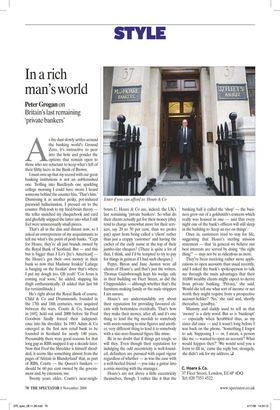In a rich man’s world
Peter Grogan on
Britain’s last remaining ‘private bankers’
As the dust slowly settles around the banking world’s Ground Zero, it’s instructive to peer into the hole and ponder the options that remain open to those who are reluctant to keep what’s left of their filthy lucre in the Bank of Brown.
I must own up that my record with our great banking institutions is not an unblemished one. Trolling into Barclloyds one sparkling college morning I could have sworn I heard someone behind the counter hiss, ‘That’s him.’ Dismissing it as another pesky, pot-induced paranoid hallucination, I pressed on to the counter. Pish-tosh to my fried-brain theory — the teller snatched my chequebook and card and gleefully snipped the latter into what I still feel were unnecessarily small pieces.
That’s all in the dim and distant now, so I asked an entrepreneur of my acquaintance to tell me what’s the point of posh banks. ‘’Cept for Hoare, they’re all just brands owned by the Royal Bank of Scotland. But — and this but is bigger than J Lo’s [he’s American] — the Hoare’s got their own money in their bank so now that Madame freakin’ Lafarge is banging on the freakin’ door that’s where I put my dough too. Oh yeah! ’Cos Jesus is coming real soon,’ he added, slapping his thigh enthusiastically. (I added that last bit for verisimilitude.) He’s right about the Royal Bank of course. Child & Co and Drummonds, founded in the 17th and 18th centuries, were acquired between the wars. Coutts & Co, founded in 1692, held out until 2000 before Sir Fred Goodwin finally forced their independence into his shredder. In 1983 Adam & Co emerged as the first new retail bank to be founded in Scotland for nearly 140 years. Presumably there were good reasons for that long gap as RBS snapped it up a decade later. Now that Fred the Shredder is himself shredded, it seems like something almost from the pages of ‘Alistair in Blunderland’ that, as part of RBS, Coutts — the Queen’s bankers — should be 60 per cent owned by the government and, by extension, me.
Twenty years older, Coutts’s near-neigh bours C. Hoare & Co are, indeed, the UK’s last remaining ‘private bankers’. So what do their clients actually get for their money (they tend to charge somewhat more for their services, say 20 to 30 per cent, than we proles pay) apart from being called a ‘client’ rather than just a crappy ‘customer’ and having the cachet of the curly name at the top of their jumbo-size cheques? (There is quite a lot of that, I think, and I’d be tempted to try to pay for things in guineas if I had such cheques.) Pepys, Byron and Jane Austen were all clients of Hoare’s, and that’s just the writers. Thomas Gainsborough kept his wedge safe in their building on Fleet Street, as did the Chippendales — although whether that’s the furniture-making family or the male strippers I am unsure.
Hoare’s are understandably coy about their reputation for providing favoured clients with bottomless overdrafts. That’s how they make their money, after all, and it’s one thing to lend the big moolah to somebody with assets running to nine figures and another, very different thing to lend it to somebody with a size-zero financial figure like mine.
Be in no doubt that if things get tough, so will they. Even though their reputation for indulging the odd eccentricity is well-founded, defaulters are pursued with equal vigour regardless of whether — as was the case with a well-heeled friend — you take a guitar into a crisis meeting with the manager.
Hoare’s are not above a little eccentricity themselves, though. I rather like it that the banking hall is called the ‘shop’ — the business grew out of a goldsmith’s concern which really was housed in one — and that every night one of the bank’s officers will still sleep in the building to ‘keep an eye on things’.
Once in, customers tend to stay for life, suggesting that Hoare’s sterling mission statement — that ‘in general we believe our best interests are served by doing “the right thing”’ — may not be as ridiculous as most.
They’ve been receiving rather more applications to open accounts than usual recently, and I asked the bank’s spokesperson to talk me through the main advantages that their 10,000 wealthy clients might expect to derive from private banking. ‘Privacy,’ she said. Would she tell me what sort of income or net worth they might require from a prospective account-holder? ‘No,’ she said and, shortly thereafter, ‘goodbye.’ Mummy and daddy used to tell us that ‘money’ is a dirty word. But so is ‘bunkrapt’ — especially when Scrabbled thus, as my sister did once — and it wasn’t long before I was back on the phone. ‘Something I forgot to ask. Supposing I — or, I mean, a person like me — wanted to open an account? What would happen then?’ ‘We would send you a form to fill in,’ came the reply but, strangely, she didn’t ask for my address. ❑
C. Hoare & Co.
37 Fleet Street, London, EC4P 4DQ Tel: 020 7353 4522


















































































 Previous page
Previous page